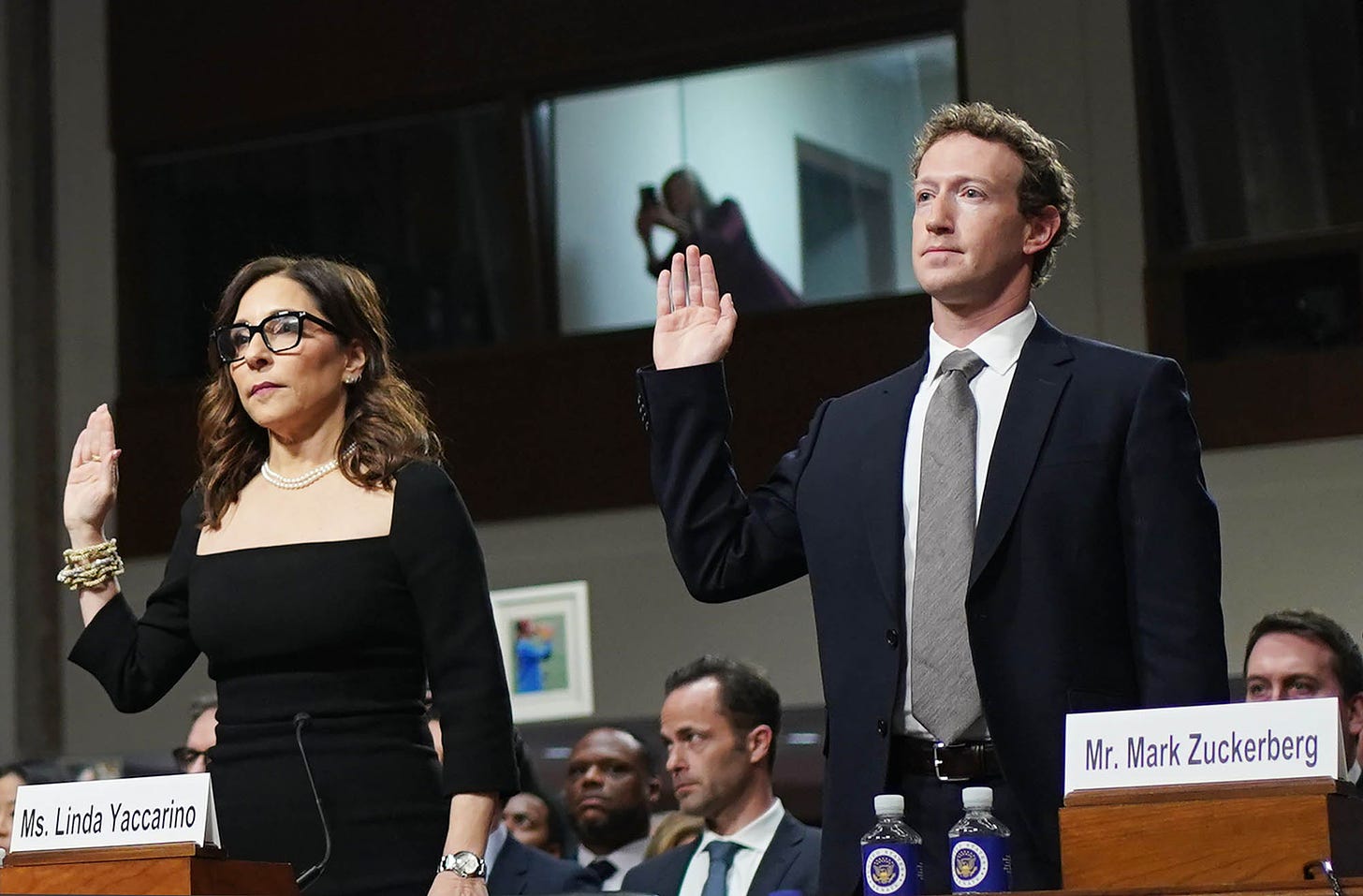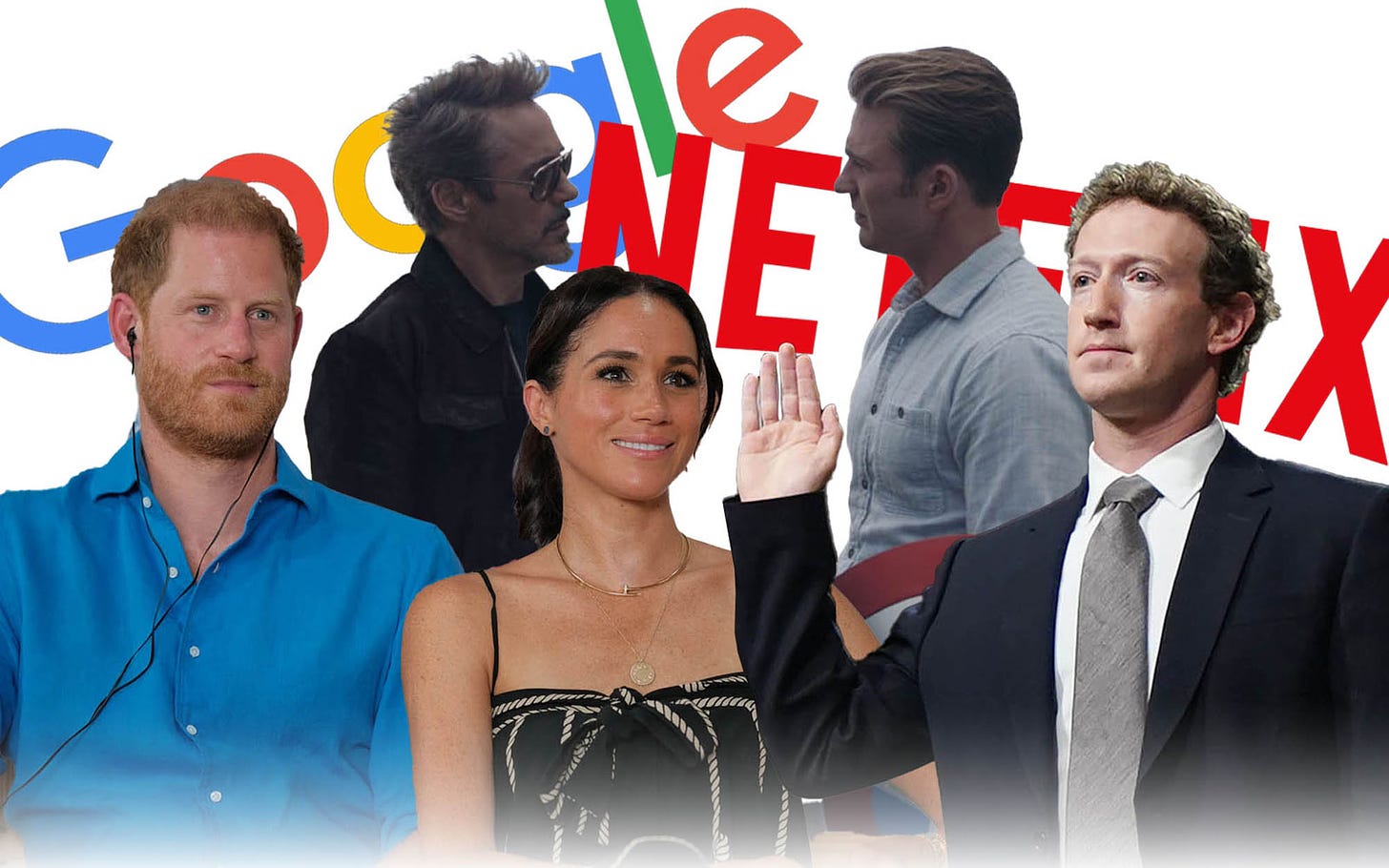Mailbag for December 13, 2024
Twinkie goo tech and IP theft, the firehose of streaming promotion, noodling Nirvana, the blind chemistry of 'offer only', what Chris Evans and RDJ get out of returning to the MCU, and accreditation
Dear Squawkers,
One of the main tenets of the dual labor strikes in Hollywood last year were concerns over AI creeping into creative industry. Both the writers and actors guilds secured provisions regarding the use of AI in Hollywood, though no one felt they went far enough. Well, guess what, AI creep is getting worse. Per The Ankler, 139,000 TV scripts have been found “training” AI programs. That’s right, 139 THOUSAND.
Technically, they’re training on the subtitles of TV scripts, which is somehow worse, because subtitles are so often incorrect. Alex Reisner built a program to search the site OpenSubtitles.org which is where all the TV writing was found. Right now, it’s believed the purpose of scraping subtitles from TV shows is to improve AI chatbots to sound more human—not creepy at all—but everyone in and around the industry shares the same fear. Eventually, the chatbots will be good enough, and all that compiled data and large learning models will be turned to WRITING scripts. Or, more accurately, regurgitating the work of others into a baby food mess an actual human will have to clean up, at lower rates, of course. (Doing script rewrites is paid less than original creation.)
Of scraping thousands of writers’ IP, human Twinkie goo Mark Zuckerberg said, “…individual creators or publishers tend to overestimate the value of their specific content in the grand scheme of this.”
Ok Mark. If that’s the case, then stop using script subtitles to improve your programs. Improve your computer programs the old-fashioned way, through your own ingenuity and labor. Screenwriters do not think they’re important—no cohort in Hollywood is more conditioned to NOT believe in their importance than writers—but they do know their work is being stolen to improve computer programs that very well could replace them. It’s not about “individual creators”, it’s about the cumulative effect of scraping over 100 THOUSAND scripts to improve LLMs. If Zuckerberg truly thinks individual creators don’t matter, then he should stop stealing their work en masse.

Also, that is the exact attitude we’re warning everyone about. These people do not see human creativity as valuable, they cannot WAIT to replace human labor with codes…that only operate correctly because they mimic pre-existing work by humans. The WGA is calling on movie and TV studios to take action against the tech companies who are stealing IP for their LLMs, but how many of these studios have business relationships with these tech companies, either through investments or conglomeration? For that matter, how many studios pretend like they ARE tech companies? (Ahem, Netflix.) Getting the studios to do anything will be an extremely uphill battle. It’ll be just like the music industry twenty years ago—they’ll watch new tech plunder their industry and won’t act until it’s far too late and everyone is worse off. And then they’ll pretend that actually, this way is better. No one owns anything and everyone is unemployed, we meant for it to be this way all along.
ANYWAY, onto to the mailbag.
Question from Tracy:
Polo comes out on Netflix tomorrow and I haven't seen any promotion by the producers, or the players/participants. Sometimes shows have interviews, or watch parties, or junkets or what have you. Question is; who decides what promotion is done and when and how? Is this part of the contractual agreements when shows are produced or purchased? Is it the network's job? If the show takes off and creates a buzz, do they then try and amplify it even further? Looking for some gossip over how this part of the business is managed.
Sarah’s answer:
This just came up with the lawsuit regarding Strange Darling, and possible breach of contract from a marketing partner on that film. Promotion is contractual, from big details like who is paying for what kind and how much of advertising (TV buys, internet ads, etc), down to the smallest details like how frequently a star will post about their project on social media, and how much they get paid per post.
Speaking to Polo, Netflix has some sooper sekrit algorithm they use to determine how they push certain projects, but there are also financial considerations. Press tours are expensive. If their algorithm tells them the extra spend won’t make a difference with viewers, they’ll trust that math and not push a show/movie (except in the case of appeasing big-name filmmakers to bring prestige and, hopefully, Oscars to the company. They’ll “waste” money on something like Maria in hopes that they’ll get trophies in return). It’s a big reason so much stuff gets lost in the content firehose, between volume and how little they promote some things, it’s easy to miss stuff.
With traditional studios, it’s pretty much the same. Everyone has their marketing guru telling them when and how to sell their movies, increasingly, the gurus are computers. But they do have a few tried and true methods, such as using film fests to burnish a film’s reputation as prestigious and doing a worldwide press tour with an ensemble cast to create viral moments and increase viewer awareness of the film.

For Polo, I assume that Netflix’s algorithm told them that the Sussex faithful and/or anyone interested in polo would gain awareness of the show but that it wasn’t worth trying to reach past the built-in audience, so they didn’t go out of their way with press. Also, Prince Harry and Meghan aren’t branding themselves as people who will do junkets, etc. I don’t think we’ll ever see a typical press tour from them. When Meghan’s cooking show rolls around, I assume she’ll give a few interviews to outlets with good, news-based reputations, do a podcast aimed at the lifestyle space, and call it a day. I don’t expect to see her sitting through a junket like she would have with Suits. That’s not the level of accessibility they’re cultivating for themselves.
Question from Monika T:
Can you make a piece about old legends i.e Nirvana. Just read this on my TL and have always thought him to be so deep and fascinating both as an artist and as a person. He really knows how to put feelings on paper. Would love to hear your takes.
Sarah’s answer:
Good idea for a feature to explore in 2025! But what does this piece look like to you? Like, explore an icon’s gossip history? Or their broader contributions to art? Is the interest just in deep dives on major celebrity/pop culture figures, or more specifically tracing their role in eras of gossip? Let me know and I can noodle on it for the new year.
Question from Ketri:
This got brought up in one of the daily chats a couple weeks ago and I’m circling back to ask it as a real question… For those actors who have made it to the “famous enough not to have to audition” stage of their careers, is it really true they never have to do anything resembling an audition again? How do directors/producers etc. evaluate if they’re the right fit if it’s someone going outside of their normal range? Or if two potential leads have chemistry?
Sarah’s answer:
It’s called “offer only” and yes, it means they never have to audition again—assuming they don’t massively fuck up their career and have to rebuild their reputation. RDJ had to go back to square one after he was incarcerated. Also, what do you define as an audition? Because an audition is really just a job interview, and an offer-only actor will still meet with a director to talk about the role, assess if it’s the right fit, etc. And that’s a job interview! But “offer only” does mean you skip all the steps before that. Basically, it means the director/producers are prepared to offer you the role if you want it. You could also think of it as the actor having right of refusal over the role.
As for chemistry, well, it’s a crapshoot. Some actors won’t subject themselves to chemistry reads—and there are plenty of examples, especially for women, where chemistry reads have been varying degrees of awkward, uncomfortable, and even predatory, so the resistance is understandable—but some prefer to know what they’re getting into with a co-star and will go through the process. But if you have two offer-only actors on a project, yeah, you’re kind of flying blind.
This is where casting directors matter, though, because a good casting director can steer the director in the, er, direction of actors who will be good for the role and the production. A good casting director knows when to say, “You won’t like how that person works,” or “I know you’re skeptical but trust me, they can do this.” Directors will sometimes have an idea of who they want for a particular role, but a good casting director can fill in the blanks and, hopefully, put together a great cast without subjecting everyone to a six-month audition process. Which is why it’s great that casting directors are going to start winning Oscars! They’re the unsung heroes of filmmaking.

Question from Jessica:
What do Chris Evans and RDJ get out of returning to the MCU other than loads of money? Maybe that’s it and that’s the answer to my question! But they’re already loaded with MCU money, the kind of money where they could feasibly do whatever they want. Nor does the MCU feel like the guaranteed hot ticket that it used to be. At one point, Evans seemed like he couldn’t get away from the MCU fast enough. What changed?
Sarah’s answer:
Does it have to be anything other than money? Because it’s pretty clearly money. As for what changed—they went and worked outside the MCU for a few years and realized they aren’t going to make that kind of money anywhere else. And it’s not just the upfront salaries, it’s the residuals. Ancillary revenues have taken a huge hit in the last 20 years, but if you get in a movie that still plays on TV, you get those sweet sweet residuals, and Marvel movies are on TV all the f-cking time. Nothing Chris Evans has done post Endgame, for instance, has been the kind of hit that will generate residuals like a Marvel movie can. So yeah, the answer is money.
Question from Charlotte:
(I'm going to mangle this question because I don't have any background in media and everything I say here is going to use media vocabulary incorrectly. I don't even know enough to know how to say what I want to know, so bear with me.) Does Lainey Gossip have any media accreditations? Or would Lainey's lanyard (or whatever) always say eTalk at media things? Do Sarah's critics association memberships have anything to do with LG or are they unrelated? I now see you on Google News, but that feels like a relatively recent development - how did that happen?
Sarah’s answer:
Perhaps Lainey can come back to this when she’s feeling better, but for me, the answer is yes and no. For TIFF, for instance, each year I am accredited through LaineyGossip, so LG is reflected on my badge. But for the Critics Choice Association and Chicago Film Critics Association, I am a member on my own merit, though my profiles with both organizations do reflect LG as my primary outlet. So I could, in theory, go write for someone else and still be a member of the CCA and CFCA, but the next time I applied for TIFF accreditation, I’d have to submit new info for a new outlet, and my badge would then reflect that organization. Film festivals usually ask for a letter from an editor and/or publisher stating they’re assigning you to cover that fest for their outlet, at least the first time you apply for a badge. As long as you’re writing for the same outlet, you can usually just tick a box, and they carry over your info from year to year. But if I did apply to write for another outlet, the new publisher would have to vouch for me.
Jacek’s answer:
Regarding the last part of your question, we have been in Google News for quite some time, but Google has just completed another major algorithm update, which they say should show people quality ‘content’ that is better aligned with their interests, as they always claim to strive for when they make these changes. So it’s quite possible that you’ve only just started seeing our posts in your news feed because they’ve somehow calibrated things to appear more relevant to you. I’m also curious where you are. Our presence in News and Search has been pretty strong in North America for a few years, but again, the results you see will be different than someone next to you based on your interests.
So it’s less about any changes we’ve made and more about those Google whims that sometimes reward you as a publisher for a period of time until their next tweak, or sometimes you drop from search results and wonder whether you’ll get your traffic back anytime soon. I see Webmaster forums/chatter about how the Search industry has been turned on its head over the last few years, especially as AI and those summarized results reduce people’s need to click through to source material. My hope is that because we’re gossiping and not just a source of facts for people, we’ll be less affected by these AI summary type searches. But a lot of publishers out there are struggling even more as this trend continues.
And that’s a wrap on mailbag 2024! We will be posting and providing daily chats next week through Thursday, after which we’ll go dark for the holiday until we come back for the Golden Globes in 2025. We will, however, keep up the daily chats here on Substack throughout the break. And remember our paid subscriber Ask Us Anything chat on Thursday, December 19 at 10pm ET!
As always, thanks for Squawking with us.
Just keep squawking,
Sarah, Jacek, and Lainey






I posted this in the chat too but want to say…kudos to the whole team on how you folks have recalibrated to give Lainey some time off. It is so awesome to see Sarah as editor, doing a kickass job and keeping us entertained on a daily basis, and to hear more about the business side from Jacek (lots of us are business nerds in addition to being pop-culture scholars). I don’t think I remember Lainey taking much/any days off in my 15 years of reading. It’s great to see that you’ve been able to make it work to support her. 🙌
Zuckerberg saying that "individual creators or publishers tend to overestimate the value of their specific content" is the same line every plagiarist uses when they get caught. Oh, we stole your writing? Stop being such a big-head about your work, it's not that important. Still important enough for you to use it for profit, of course.